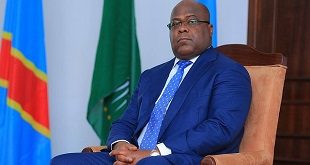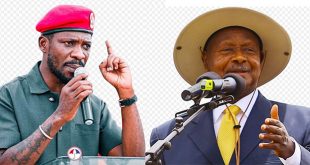TK:
I have not given you my research facts. You will get them. Being the researcher I am, do not imagine I can hold such strong views on Rwanda without getting a few hard facts to back up my views (or bias). I was not born with these views on Kagame and I am not a Hutu with an ethic reason to have them.

AM:
If you had them, I imagine in the six years we have spent debating Rwanda, you would have produced them. But I will give you the benefit of doubt. Yet you refuse to respond to why you think that of all Hutu that Kagame/ RPF has reconciled with, only Ingabire matters. You are obsessed with this one person to the point of ignoring more prominent and powerful and influential Hutu leaders.
Are you aware that the chief of staff of the ex-FAR during the genocide and who had also been Habyarimana’s chief negotiator in Arusha, Marcel Gatsinzi, has been minister of defense until two years ago? Are you also aware that Kayibanda’s sister is the commissioner for the children’s commission? Are you aware that senator Augustine Yamuremye, who also represents Rwanda in the AU parliament for the last eight years, previously minister of foreign affairs, agriculture etc.. is husband to the daughter of Kambanda, the prime minister during the genocide and who has been convicted by ICTR?
Are you also aware that children of genocidaires are being sponsored to study abroad by the government; that even Hutu rebels in Congo send their children to Rwanda who study for free and are given scholarships to study abroad without discrimination because government has a policy of not punishing anyone because of their parents? This is not to mention initiatives at lower levels to return Hutu exiles with amnesty. I can go on and on giving examples of what is happening. You just do not want to admit it, Tim. Of course all this is not to mention government policies and programs that benefit all Rwandans equally- health care, education, infrastructure, agriculture extension services, beautification of villages and towns etc.
TK:
We started arguing about Rwanda in 2006. I am glad you had the foresight to give me the benefit of doubt. I have refused to sympathize with Gen. Nyamwasa just because he fell out with Kagame. Why? My research shows he has blood on his hands. So it’s not as if anything anti-Kagame I support. I am looking for the truth. Kagame and the RPF have never hurt, cheated or disadvantaged me in any way, so I do not have reason to oppose them, except because of facts. Even if Rwanda became a glittering G-7 economy tomorrow, my views on the RPF and Kagame would not change. As a moralist and interested in justice, it is the trail of blood of the RPA that interests me, not in beautiful streets. No doubt, however, that in public administration the RPF has been fairly good.
AM:
Did RPF kill? You bet it did. I do not expect any war without collateral damage. The standard is whether a movement killed indiscriminately. On this ground, RPF is a sane movement. Second, you claim RPF killed but have not presented any facts to back up your claims. Even if you gave those facts, we still have to assess whether any such killings were indiscriminate and therefore a character of the organization or if they were incidental and therefore acts of errant officers.
TK:
If, as I do my research, I discover that my data or facts about the RPF’s trail of blood are wrong, I will publically, in a written article, apologize for having misunderstood them. And from that point, I will start liking Kagame and RPF and I will not care whether or not Kigali has fast internet.
On April 15, 2005 when the Daily Monitor ran that day’s installment of your biographical series with Obote, when Obote gave his side of the Luwero massacres, I sent you an emotional SMS thanking you for your part in shedding light on that crucial point of Ugandan history. If I were to discover that the information I have about the RPF is wrong, I would visit the Rwandan embassy and apologize. That genocide is very important and personal for point scoring or ego.
AM:
Are you aware that of the 54 percent of women serving in Rwanda parliament almost half of them are from the forests of Congo where they had run for refugee from RPF and were afraid to return until they returned? It is unfortunate the government of Rwanda cannot come out to list all these things because first it seeks to promote people on merit than tribe, and second because it wants to avoid such categorizations.
TK:
Some of what you are telling me, I did not know and I am taking note. That’s how I do research: listening to all sides. As I have said, if my research proves wrong about the RPA/RPF, what else? Over questions of human life and blood, I will be glad to fully acknowledge my prior erroneous position. I have researched the RPF from the early days of Tutsi refugees in Uganda; these refugees joining the GSU and state research bureau; the first Rwandan association in 1979, formation of the RPF and the house where it was held; the Tutsi elite in Kampala who fell out with Kagame in 1987; the planning meetings for the1990 invasion; the first month inside Rwanda; deaths of Rwigyema and company; the first bodies floating to Kagera river in 1994 genocide.
AM:
I am waiting to read your findings and subject them to a forensic audit for both their factual validity and logical consistency. Four days later, I sent Tim an extra SMS on this subject: I have been meaning to reply to you on the importance you attach to human rights in your assessment of countries and leaders. For a man who has made it his mission to white wash Idi Amin’s atrocities, this was very shocking to me. For a man who has always praised western economic dominance, especially the United States (a nation build on black slave labor and genocide of the indigenous people on America), I just cannot understand you anymore.
amwenda@independent.co.ug
 The Independent Uganda: You get the Truth we Pay the Price
The Independent Uganda: You get the Truth we Pay the Price


